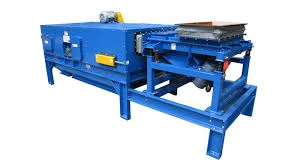

Dhj . 06, 2024 05:45 Back to list
The Importance of Scrap Steel Shredders in Modern Recycling
In today's world, where sustainability and environmental conservation are at the forefront of global concerns, the recycling of materials has become increasingly vital. Among the various materials that can be recycled, steel stands out due to its unique properties and widespread usage. One of the key components in the steel recycling process is the scrap steel shredder. This article explores the significance of scrap steel shredders, their operation, benefits, and their role in promoting a circular economy.
What is a Scrap Steel Shredder?
A scrap steel shredder is a heavy-duty machine designed to process steel scrap into smaller, more manageable pieces. The shredding process involves feeding large pieces of scrap metal into the machine, where powerful rotating blades or hammers break them down into smaller fragments. The resulting smaller scrap can then be more easily transported, sorted, and processed for recycling. Various types of scrap steel shredders are available, ranging from small-scale machines for local operations to large industrial units capable of handling massive quantities of material.
The Operating Principle
The operation of a scrap steel shredder is fairly straightforward. It begins with the collection of scrap steel from various sources, including old vehicles, construction debris, and industrial waste. Once collected, the scrap steel is loaded into the shredder. The blades within the shredder rotate at high speeds, exerting tremendous force to slice through various types of metal, including ferrous and non-ferrous materials. The shredded metal can then be passed through magnetic separators to remove any non-metallic materials, ensuring a clean and pure product.
Benefits of Scrap Steel Shredders

1. Enhanced Efficiency Scrap steel shredders significantly improve the efficiency of the recycling process. By reducing large pieces of steel into smaller, uniform fragments, these machines facilitate easier transportation and handling. This efficiency translates into lower operational costs and increased throughput for recycling facilities.
2. Quality Control The shredding process helps improve the quality of recycled metal. Clean, shredded steel is easier to sort and purify, which is essential for producing high-quality end products. The elimination of contaminants during shredding ensures that the recycled material meets industry standards.
3. Environmental Impact Recycling steel reduces the need for virgin material extraction, which can be detrimental to the environment. The use of scrap steel shredders contributes to lower greenhouse gas emissions, reduced energy consumption, and less waste in landfills. By promoting recycling, shredders play a crucial role in conserving natural resources and minimizing the ecological footprint of the steel industry.
4. Supporting the Circular Economy Scrap steel shredders are essential in facilitating a circular economy, which aims to keep resources in use for as long as possible. By efficiently processing scrap steel into a form suitable for reuse, these machines enable manufacturers to produce new steel products from recycled materials, thereby reducing dependency on newly mined metals.
5. Job Creation and Economic Benefits The effective operation of scrap steel shredders also has economic benefits. Recycling facilities employ numerous individuals, from operators and maintenance staff to quality control personnel. Additionally, the availability of recycled steel can lead to cost savings for manufacturers, creating a ripple effect throughout the economy.
Conclusion
In conclusion, scrap steel shredders are indispensable tools in the recycling industry. Their ability to efficiently process scrap metal not only enhances operational efficiency but also contributes to significant environmental benefits. As the world continues to prioritize sustainability and responsible resource management, the role of scrap steel shredders in promoting a circular economy and reducing the environmental impact of steel production will only grow in importance. Investing in advanced shredding technology is thus crucial for the future of steel recycling and the overall health of our planet. By embracing and improving these technologies, we can ensure that precious resources are conserved and repurposed for generations to come.
Latest news
Troubleshooting Common Eddy Separator Problems
NewsJul.04,2025
The Role of Metal Recycling Plants in Circular Economy
NewsJul.04,2025
The Impact of Recycling Line Pickers on Waste Management Costs
NewsJul.04,2025
Safety Features Every Metal Shredder Should Have
NewsJul.04,2025
How Industrial Shredders Improve Waste Management Systems
NewsJul.04,2025
How Cable Granulators Contribute to Sustainable Recycling
NewsJul.04,2025